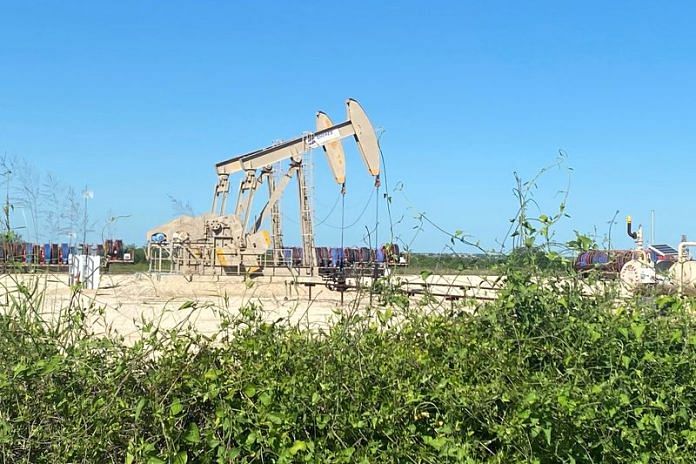By Arathy Somasekhar
HOUSTON (Reuters) -Oil rose nearly 2% on Monday as investors worried about disruptions to maritime trade and supply costs after the Iran-aligned Yemeni Houthi militant group attacked ships in the Red Sea.
A Norwegian-owned vessel was attacked in the Red Sea on Monday and oil major BP said it had temporarily paused all transit through the water. Other shipping firms said over the weekend that they would avoid the route.
Brent crude futures settled higher $1.40, or 1.8%, to $77.95 a barrel, while U.S. West Texas Intermediate crude rose $1.04, or 1.5%, to $72.47. Both benchmarks had risen nearly $3 earlier in the session.
“There are now the increased supply costs to consider as a growing number of oil tankers are halting all sails through the Red Sea strait,” said Fawad Razaqzada, market analyst at StoneX.
About 15% of world shipping traffic transits via the Suez Canal, the shortest shipping route between Europe and Asia. London’s marine insurance market widened the area in the Red Sea it deemed high risk on Monday, adding to premiums ships pay.
U.S. Defense Secretary Lloyd Austin said Washington was building a coalition to address the Houthi threat and said defence ministers from the region and beyond would hold virtual talks on the issue on Tuesday.
The contracts last week posted a small gain, following seven weeks of decline, after a U.S. Federal Reserve meeting raised hopes that the U.S. central bank’s interest rate hikes are over and cuts are on the way.
However, ample oil supply limited price gains on Monday. Brent and U.S. crude for prompt delivery traded at a discount to future deliveries, signalling a well-supplied physical market.
Also adding support, Russia said on Sunday it would deepen oil export cuts in December by potentially 50,000 barrels per day or more, earlier than promised, as the world’s biggest exporters try to support global oil prices.
Russia announced the deeper export cuts after it suspended about two-thirds of loadings of its main export grade Urals crude from ports due to a storm and scheduled maintenance on Friday.
Meanwhile, Saudi Arabia’s crude oil exports in October hit their highest level in four months, data from the Joint Organizations Data Initiative showed.
Markets may also be seeing some short covering, analysts said. Money managers cut their net long U.S. crude futures and options positions in the week to Dec. 12, the 11th straight week of cuts, the U.S. Commodity Futures Trading Commission said on Friday.
U.S. oil output from top shale-producing regions is set to decline in January for the third consecutive month, the U.S. Energy Information Administration (EIA) said, while production from the top Permian basin is set to rise to a record for an eighth straight month.
“Considering today’s rally and the positive action from last week, there’s a chance that oil might have hit rock bottom,” StoneX’s Razaqzada said.
(Reporting by Arathy Somasekhar, Georgina McCartney in Houston, Alex Lawler in London, additional reporting by Florence Tan and Emily Chow; editing by Jason Neely, Paul Simao, Deepa Babington, Chizu Nomiyama and Cynthia Osterman)
Disclaimer: This report is auto generated from the Reuters news service. ThePrint holds no responsibilty for its content.



